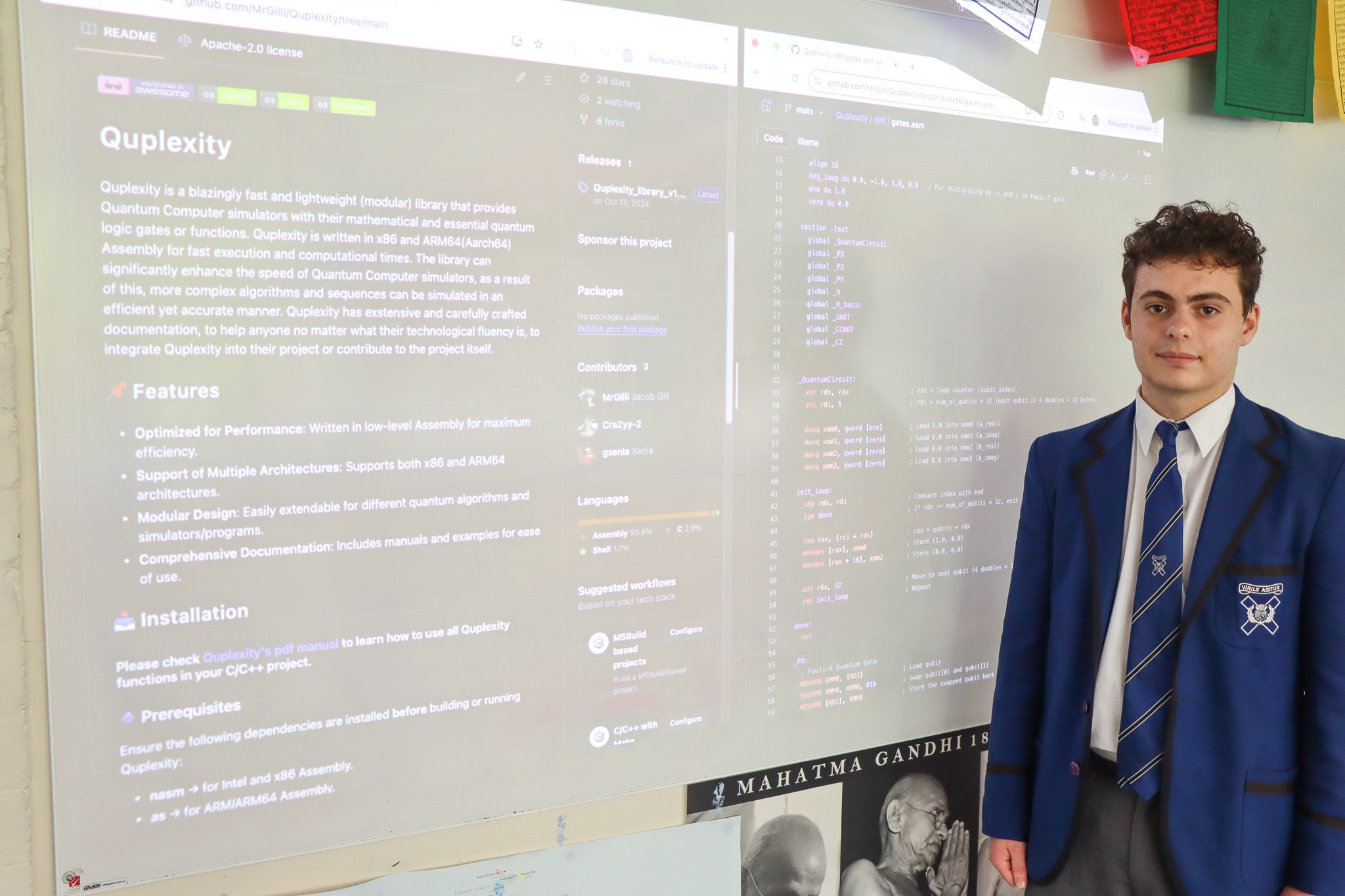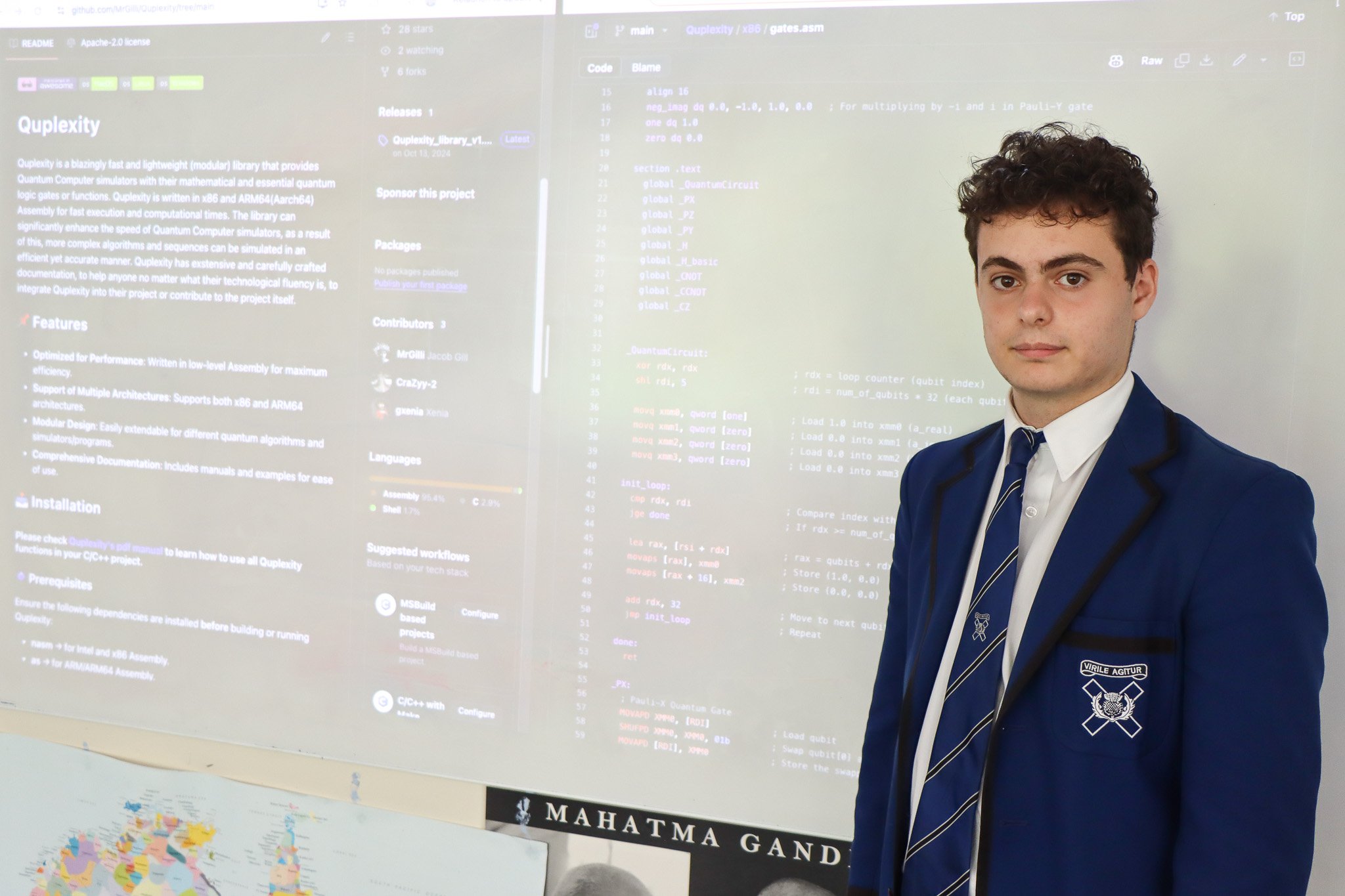
Knox Grammar’s Innovation for Change program welcomes students with passion and talent for technology to apply for support in their journey.
Knox Grammar School
“It’s like PEAK (Pathways for Elite Athlete) but for technologists,” said Melinda Valent, the Technological and Applied Studies teacher and Assistant Head of Department.
Innovation for Change is a technology innovation program in which students can progress their own tech project and receive additional support to develop the project with access to the wider community through the Knox network, including the Old Knox Grammarians' Association (OKGA). Students can apply to be a part of this program at any stage of their project, from ideation to iteration to grant application.
A Knox student, Jacob (Year 12), recently shared his experience in Innovation for Change: “I was offered a PhD in the field of Computer Science (focusing on quantum computer simulation) by Prof. Pierre Collet for my work on my Quantum Computing Simulation library, while I am currently in the process of completing my HSC at Knox Grammar School. Prof. Collet offered me a Masters 2 Internship which I am still working on.”
Back in Year 10, Jacob was doing a Global Challenge project as part of the Knox Certificate of Global Competency, and that was when he started developing a search engine. But he came across a slight roadblock – it would take up too much people-power to build a search engine that rivals Google or Bing.
So, he pivoted to quantum computing simulations. Over the holidays, he did some research and started learning how to build a simulator.
At Knox, he is a part of Innovation for Change (I4C). He is currently developing an open-source library to integrate with existing simulators.
What has been your focus in the Innovation for Change (I4C) Co-Curricular?
My primary goal in attending the I4C Co-Curricular has been to expand my Quantum Computer Simulation library – Quplexity, while also increasing its visibility to encourage usage and contributions to its development.
How did your interest in this topic come about?
I was scrolling through various topics on GitHub when I came across the section/topic for Quantum Computing.
What led you to creating the library for the quantum computer?
As I delved deeper into this newly discovered field of Quantum Computing, I came across IBM’s Qiskit GitHub repository. After exploring its codebase and conducting my own research, my interest in the subject grew significantly. I soon realised that existing Quantum Computer Simulators primarily relied on higher-level programming languages, which could impact performance. This led me to the idea of developing my own Quantum Computer Simulator in a lower-level language for improved efficiency. I chose x86 and ARM64 (AArch64) Assembly, which is known to be a challenging language to learn but arguably the most performant option available.
Who have you collaborated with?
I have met and collaborated with many notable figures in the field of Quantum Computing, including: Prof. Pierre Collet, Prof. C Ferrie, Dr. Simon Devitt, Dr. Yaseer Abdussalam (Medical Doctor), Dr. Cassandra Grenade (Unitary Foundation), Dr. Luciano Bel, Dr. Reece Roberts, Daniel Strano (Unitary Foundation, Masters in Physics), Gabriella Xenia, Leon Kaiser (Masters in CompSci from Stanford Uni), Jeremiah Mccutcheon, Trent Nelson (Principal Software Engineer at NVIDIA), and many more.
My Quantum Computer Simulation library/toolkit is also used in various established projects, including Quantum Quokka, LLY-DML, Qrack, and soon to be used in IBM Qiskit.
What advice do you have for anyone considering this type of project or research?
If I could offer advice to someone pursuing a similar project or idea, it would be to recognise that challenges and setbacks are inevitable, and perseverance is essential. If you’re genuinely passionate about what you’re building if it truly excites you—then it’s worth starting, because when obstacles arise, you’ll likely persevere.
Where do you see this project work taking you next?
I believe this project has and will continue to enhance my programming ability and allow me to network with people that have similar interests. I also believe that my project will provide me with a gateway into professional research.
If students are interested in pursuing this field, students of Years 9 and 10 are encouraged to get in touch with Melinda Valent or Chuck Ardron, Senior School Director of Co-Curricular Operations of Senior School.


18 February 2026
Recently, our Year 5 Prep students ventured to CRU Camp at Lake Macquarie, where they stepped beyond their comfort zones and tried a range of new activities.

13 February 2026
Prep School Captain Andrew and Vice-Captain Aadhi shared their leadership journey, their mission, their vision, and a key message for their peers.

12 February 2026
School Captain Mani and Vice-Captains Lewis and Miles shared their pathways to becoming school leaders.
Subscribe to our eNewsletter
©2019 Knox Grammar School, All rights reserved.